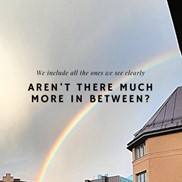You are here :
- EUTOPIA website
- Home
- ENGAGEMENT
- INCLUSION & DIVERSITY
Student Perspectives: Laura (GU)
What does inclusion mean to you?
The picture below represents my take on inclusion: while we're capturing the clear seven colours of the rainbow, real inclusion needs to also capture all the shades and mixtures of colours in between. Universities, companies, and politicians are using the word inclusion in their everyday strategies and have implemented policies to be more inclusive, but if you don't fit a specific group 100% (as for example a university defines it) you won't receive the benefits you might need. So, we're being inclusive but there's so many more parts we need to tackle to actually be able to call ourselves inclusive.

Are there any inclusive practices at your university that you would like to highlight?
Something I value highly at the university is the offer of free Swedish courses. Offering this is a good practice as it promotes including international students into the Swedish culture and making them more quickly feel at home and at ease.
The courses are not actually 100% free as you have to purchase the books – changing this could be better to really offer the course to everyone, no matter your budget. Moreover, the courses fill up very quickly, so if you were busy when the course registration opened you would have to wait months before trying again. The university could try to fill this gap: not making students wait months to learn Swedish and potentially lose them as they get discouraged over time, but rather capturing their attention from the beginning by offering enough course spots.
Are there aspects of life at university that you think are not inclusive?
International students are fairly lost. Right now, the student unions do claim to be for all students, both Swedish and international students. However, when you look more closely their promotions are often only in Swedish. If they are in Swedish and English, then the English event description is kept very short and includes only the necessary details to attend, while the Swedish is written to sound fun and exciting.
Also, the student unions offer a very different range of activities for their students. I have to admit that I got lucky as my union ran quite a few events, especially when I arrived. My roommate, however, did not have any welcome events organized by her student union and, therefore, pretended to belong to my faculty just so she had the chance to come to some welcome events and meet new people.
Moreover, when attending the student union events, very often if there are any announcements they’ll be done in Swedish and you need to ask around to find out what they mean. You’ll be one of the two or three non-Swedish speakers at the event, and if you’ve just arrived you probably don’t speak Swedish well enough to have full conversations. This makes you feel fairly left out and like you don’t belong. Making sure to have welcome events offered for all students, regardless which student union or faculty you belong to, and promoting them more to international students so that more attend (and more feel comfortable to attend) would be a good start to improve this.
What new or improved practices would you like to see?
When I did my exchange semester in the US, what I loved was that sign language-courses were offered that you could take in exchange for credits of other courses. So this wouldn’t be an ‘extra’ course that you would take on, and you wouldn’t have to worry about increasing your workload.
About every third person I ran into knew the basics of sign language, some of them knowing it fluently. I believe that this would be a very impactful and important way to be more inclusive – breaking down the barriers between deaf, hard-of-hearing, and hearing students. Not only will this be impactful at university but also outside of classes in everyday life and in the future working life.
We also need to expand on our provision of CV and interview workshops: this is another thing that some faculties have more than others. It would be good to make students more aware of how discrimination can happen in recruitment processes, especially in interviews – it can be overwhelming when you’re in that situation and you don’t know how to deal with it.


